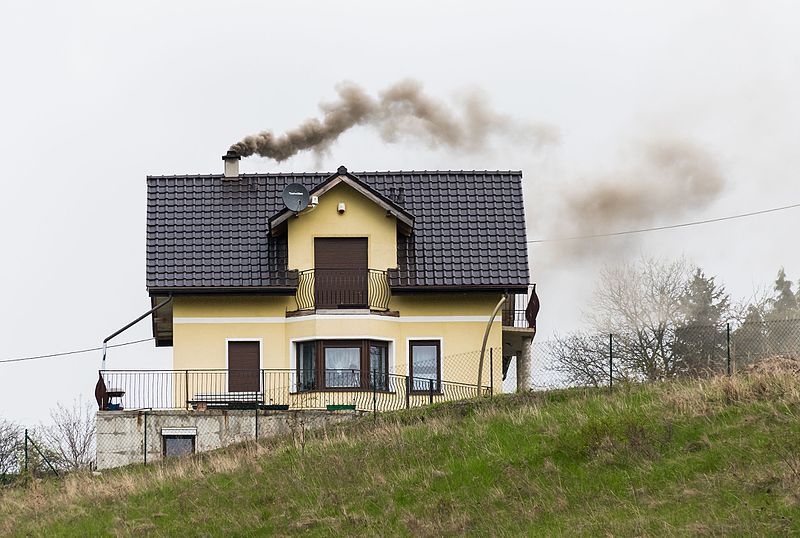The poorest households will now be eligible to obtain additional state financing to upgrade old, polluting heating systems, after the government moved to close a loophole that had previously left many excluded from Poland’s Clean Air programme.
Poland has long struggled with some of the worst air pollution in Europe, which causes 47,500 premature deaths annually, according to the European Environment Agency. One of the main sources of the problem is the burning of low-quality fuels to heat homes.
In 2018, the government launched its flagship “Clean Air” programme, which aimed to tackle smog by providing households with funds to replace old heaters and to improve insulation. It is theoretically the largest such programme of its kind in Europe.
The initiative has, however, been beset by difficulties. Of the 103 billion zloty (€22.5 billion) allocated to it, there have only been applications filed for 2.8 billion zloty of subsidies and just 0.5 billion has actually be paid out, reported Dziennik Gazeta Prawna in May.
Poor implementation and low uptake led the European Commission to last year consider withdrawing funding for the programme, reported Euractiv. Poles living in rural communities had particular difficulties in accessing the funds.
One problem was that poorer households were unable to seek financial support to replace their heaters because local governments were unable to issue certificates of income – which are needed for the application – to confirm households were eligible for support, reported Interia in May.
This left a large proportion of people excluded from support, with as many as 52% of potential beneficiaries of the Clean Air programme being households with a monthly income per person of less than 1,400 zloty, estimates the World Bank.
Now, however, the government has announced that, from the start of October, a pilot programme will see low-income households able to apply for subsidies of up to 37,000 zloty. This will include up to 32,000 zloty towards the replacing an old heater and an extra 5,000 zloty for households that include a photovoltaic installation.
The increased subsidy will be available for multi-person households with a net income per person of less than 1,400 zloty, or single-person households with a net income of 1,960 zloty.
Climate minister Michał Kurtyka said earlier this month that the aim is for the Clean Air programme to provide financing to modernise heating and insulation in 3.05 million buildings by 2029.
Speaking to Biznes Alert, Bartłomiej Orzeł, who oversees the Clean Air programme, said that he hoped “for an increase in submitted applications” as a result of the new subsidy measures.
“The attitude of Poles is changing,” he said. “Therefore, I am convinced that the number of applications will increase year by year.”
Last month, the Air Quality Life Index (AQLI), an international pollution ranking, found that Poland had the worst air quality in Europe.
However, it also noted that a fall in air pollution over the last two decades had seen life expectancy increase in many places, including by an average of two years in the coal heartlands of Poland’s Silesia Province.
In the World Health Organisation’s rankings of the EU cities with the most polluted air, Poland takes 36 of the top 50 places. Among all Polish cities, 72% exceeded the EU’s air quality target, second in the bloc only to Bulgaria (83%).
Poland has 36 of Europe's 50 most polluted cites on an updated list published by @WHO (up from 33 on the previous ranking). 72% of Polish cities violate the EU's air quality target (second only to Bulgaria at 83%).
Chart via @UE: https://t.co/O0RnVwrBRF pic.twitter.com/tdRcTvtqz7
— Notes from Poland 🇵🇱 (@notesfrompoland) May 8, 2018
After being re-elected in October 2019, the government set up a new climate ministry. Its head, Kurtyka, promised that tackling air pollution would be a priority.
However, while government-led efforts have had a limited impact so far, many cities have taken the lead in addressing their problems with smog.
Kraków, which has been notorious for its bad air in recent years, last year became the first place in Poland to ban the burning of coal and wood. Various cities have also used drones to monitor what residents are burning in their homes. Many areas are expanding their fleet of electric buses and offering free public transport during times of bad pollution.
Kraków has launched an app that allows users who spot chimneys producing suspiciously dirty smoke (suggesting the burning of illegal substances such as coal or trash, which are a major cause of air pollution) to send a photo and geolocation data to the authorities to investigate pic.twitter.com/YpVo1Z7BRq
— Notes from Poland 🇵🇱 (@notesfrompoland) October 2, 2019
Main image credit: Jacek Halicki/Wikimedia (under CC BY-SA 4.0)

Juliette Bretan is a freelance journalist covering Polish and Eastern European current affairs and culture. Her work has featured on the BBC World Service, and in CityMetric, The Independent, Ozy, New Eastern Europe and Culture.pl.




















